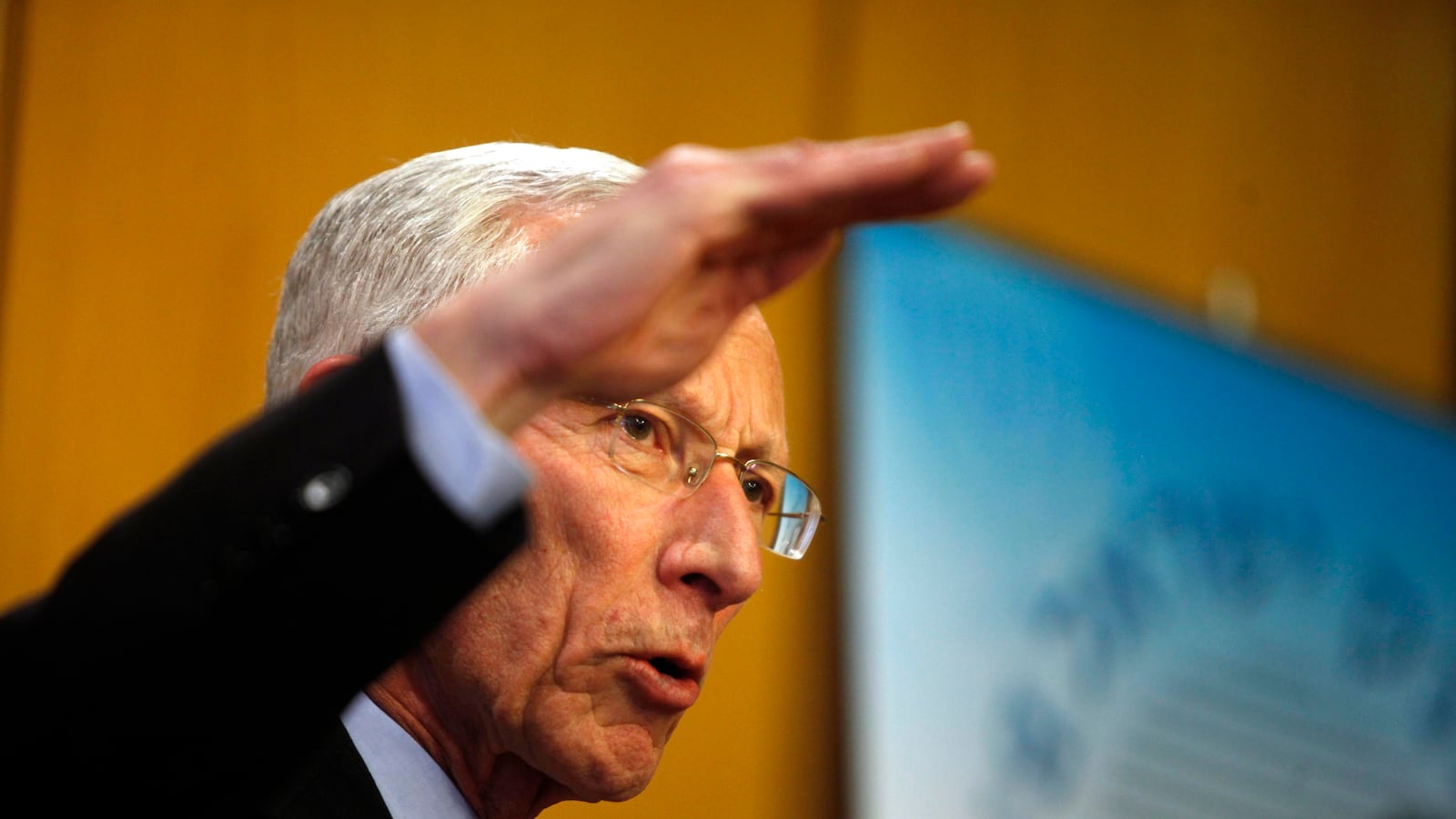Stanley Fischer is not saying why he is resigning from the Bank of Israel. He doesn't have to. The Likud government's budget, which is now on a two-year cycle, is busted, with a projected deficit of 40 billion NIS, about $10 billion, or 4.2 percent of GDP. The chickens are coming home to roost. Presumably, Fischer would rather be roosting home in Cambridge, Mass.

The target ceiling for annual deficits in euro zone countries is 3.5 percent of GDP. Considering its accumulated debt, Fischer thinks Israel's should be at 2.5 percent. This means Israel's incoming government, if it is prudent in an MIT sort of way, will have to cut social programs severely. Oh, but Israel is a country where average salaries are $2,500 per month, a couple's apartment of 100 square meters in Tel Aviv is about $600,000, labor force participation (largely owing to subsidies for Haredi "students") is at least 10 percent below the OECD standard, major hospitals are at over 150 percent capacity, universities budgets are being cut by $10 million, and it takes 8 years to build a high speed rail link between Tel Aviv in Jerusalem. (That's 36 miles, a rounding error for China's construction engineers.)
The alternative to draconian cuts is raising taxes like the (instantly regressive) VAT or income taxes on the "well-to-do," meaning people currently netting about $4,000 a month. Or imposing an inheritance tax, which means most apartments will no longer pass to children without probate. One could raise taxes on capital gains, already at 25 percent, but this will hit mainly the middle class, which earns virtually no interest from bank deposits, and invests in stocks as a hedge against inflation, since big money people invest (and successfully shelter) fortunes abroad.
Apropos inflation, the government could try to inflate its way out of this crisis, covering the deficit by printing money. Exporters would presumably like that, since it will lead to a devaluation of the shekel. The trouble is, a lot of exporters are also importers of components and capital equipment. Global corporate investors, whose intellectual capital is crucial for Israeli entrepreneurship, will be spooked. It also means higher interest rates, not only for the government, whose debt to GDP is 75 percent, but for people buying real estate. Raise the mortgage rate by three points, and the housing bubble will burst, leaving some tycoons like Nochi Dankner (who owns Discount Bank) and Lev Leviev under water.
Thanks to Fischer's more or less stringent regulation of Israeli banks, Dankner's IDB can no longer use Discount Bank as a personal piggy-bank. (Neither can Shari Arison's group use Bank HaPoalim to cover her losses.) Fischer has kept Israel's banking system as tightly monitored and protected from foreign competition as Canada's, which is probably the only reason why self-satisfied Israeli banking executives did not become Icelandic during the 2008 global melt-down. On the other hand, Israel's banking oligopoly feels to ordinary consumers like a protection racket. Households and small businesses funneled over $5 billion (19.2 billion NIS) in banking fees and service charges to the banks, double the major business sector.
In other words, if the Israeli government does nothing but stay the course, start-up nation will be slow-down nation, more like Europe's basket-cases than Asia's tigers. When reporters asked him if he were leaving to avoid presiding over the looming fiscal crisis, Fischer answered, with the shrewdness of a politician, that reporters would be asking him this no matter when he left. As they say in South Boston, "I'm all set."
I am not suggesting (nor is Fischer) that this last Netanyahu government has been as irresponsible as Likud Finance Minister Yoram Aridor was back in 1981, when—facing an election, too—he bought off Likud's poor Mizrahi base with mountains of consumer subsidies and alleviations of import tariffs, eventually running inflation up to 400 percent in 1984. Fischer is probably right that a combination of cuts (say, to family allowances), or defense, and, moderate tax increases, can get Israel's balance sheet back to where foreign bond holders will sigh with relief. He would certainly rather raise taxes, and absorb moderate inflation, than cut the public sector—45 percent of the economy—to the point of spiking unemployment. Spread the pain.
But what Fischer is not saying—at least not since January 2007, when he committed the ultimate gaffe, namely, telling Haaretz what he really believed—is that this economy is not growing at anything like the pace it could if the government were internationally assumed to be moving to peace—as in the 1990s, when global corporate investors were crowding in, and rates of 6 to 7 percent were common. In 2012, the population grew by 1.8 percent and the economy grew by only 1.5 percent per capita, 3.3 percent in all. How do you pull a third of Israeli children (and 40 percebt of Arab households) currently below the poverty line into middle class lives, or save Israel's public educational and medical institutions, with anemic growth?
Fischer was born in Rhodesia and doesn't need lectures about colonial over-reach. But the economic problem is not just past billions wasted on settlements, or Haredi Yeshivot, for that matter, or endless air force practice bombing runs on Iran. It is rather a government that does not understand the opportunity cost of occupation; a country that is heading toward economically damaging global isolation when it needs to grow robustly out of explosive social inequalities: "We can grow without progressing toward peace," Fischer said, but with peace, growth would be much higher: “[W]e are talking about the difference between four percent growth a year and growth of five to six percent a year. And the difference between four percent growth and six percent growth is not two percent—it’s 50 percent.”
Fischer was asked if he might agree to become the finance minister in a new government. He dismissed the idea out of hand. He was then asked if he might agree to become the foreign minister. He answered that this was not offered. As I said, the shrewdness of a politician.






